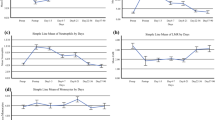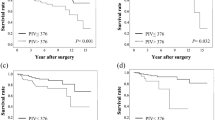Abstract
Background
Tumor-associated systemic inflammatory response has been correlated with prognosis. Our aim was to analyze the utility of inflammation-based prognostic scores for prognostication and patient selection for cytoreduction and perioperative intraperitoneal chemotherapy (POIC) in patients diagnosed with peritoneal metastasis of colonic origin.
Methods
A retrospective analysis of a prospectively maintained database for all patients treated for peritoneal metastasis of colonic origin from February 2001 to April 2015. Inflammation-based prognostic scores including neutrophil–lymphocyte ratio, platelet–lymphocyte ratio (PLR) and Onodera’s prognostic nutritional index (ONI) were calculated.
Results
Of 123 patients, 70 (56.9%) were men and 53 (43.1%) were women. Mean age at diagnosis was 49.9 years. Significant prognosticators in univariate analysis included intraoperative peritoneal cancer index (p < 0.000), tumor marker CA19-9 (p < 0.000), PLR (p = 0.020), POIC regimen (p < 0.003), and completeness of cytoreduction (p < 0.000). Multivariate Cox analysis identified CA19-9 (hazard ratio [HR] 1.0; 95% confidence interval [CI] 1.00–1.01, p = 0.031), ONI (HR 0.86; 95% CI 0.79–0.94, p < 0.000), PLR (HR 1.0; 95% CI 0.90–1.01, p = 0.041), incompleteness of cytoreduction CC2 and CC3, and mucinous adenocarcinoma histology as significant independent prognosticators.
Conclusions
The inflammation-based prognostic scores PLR and ONI and tumor marker CA19-9 are significant prognosticators of survival. They are useful in patient selection and prognostication for cytoreductive surgery and POIC in patients with peritoneal carcinomatosis of colonic origin.


Similar content being viewed by others
References
Proctor MJ, Morrison DS, Talwar D, et al. A comparison of inflammation-based prognostic scores in patients with cancer. A Glasgow Inflammation Outcome study. Eur J Cancer. 2011;47:2633–41.
Messager M, Neofytou K, Chaudry MA, Allum WH. Prognostic impact of preoperative platelets to lymphocytes ratio (PLR) on survival for oesophageal and junctional carcinoma treated with neoadjuvant chemotherapy: a retrospective monocentric study on 153 patients. Eur J Surg Oncol. 2015;41:1316–23.
Demaria S, Pikarsky E, Karin M, et al. Cancer and inflammation: promise for biologic therapy. J Immunother. 2010;33:335–51.
Dinarello CA. The paradox of pro-inflammatory cytokines in cancer. Cancer Metastasis Rev. 2006;25:307–13.
Nozoe T, Saeki H, Sugimachi K. Significance of preoperative elevation of serum C-reactive protein as an indicator of prognosis in esophageal carcinoma. Am J Surg. 2001;182:197–201.
McKeown DJ, Brown DJ, Kelly A, Wallace AM, McMillan DC. The relationship between circulating concentrations of C-reactive protein, inflammatory cytokines and cytokine receptors in patients with non-small-cell lung cancer. Br J Cancer. 2004;91:1993–5.
Hilmy M, Bartlett JM, Underwood MA, McMillan DC. The relationship between the systemic inflammatory response and survival in patients with transitional cell carcinoma of the urinary bladder. Br J Cancer. 2005;92:625–7.
Jamieson NB, Glen P, McMillan DC, et al. Systemic inflammatory response predicts outcome in patients undergoing resection for ductal adenocarcinoma head of pancreas. Br J Cancer. 2005;92:21–3.
Coussens LM, Werb Z. Inflammation and cancer. Nature. 2002;420:860–7.
Balkwill F, Mantovani A. Inflammation and cancer: back to Virchow? Lancet. 2001;357:539–45.
Hanahan D, Weinberg RA. Hallmarks of cancer: the next generation. Cell. 2011;144:646–74.
Ding PR, An X, Zhang RX, et al. Elevated preoperative neutrophil to lymphocyte ratio predicts risk of recurrence following curative resection for stage IIA colon cancer. Int J Colorectal Dis. 2010;25:1427–33.
Chua W, Charles KA, Baracos VE, Clarke SJ. Neutrophil/lymphocyte ratio predicts chemotherapy outcomes in patients with advanced colorectal cancer. Br J Cancer. 2011;104:1288–95.
Hung HY, Chen JS, Yeh CY, et al. Effect of preoperative neutrophil–lymphocyte ratio on the surgical outcomes of stage II colon cancer patients who do not receive adjuvant chemotherapy. Int J Colorectal Dis. 2011;26:1059–65.
Chiang SF, Hung HY, Tang R, et al. Can neutrophil-to-lymphocyte ratio predict the survival of colorectal cancer patients who have received curative surgery electively? Int J Colorectal Dis. 2012;27:1347–57.
Kaneko M, Nozawa H, Sasaki K, et al. Elevated neutrophil to lymphocyte ratio predicts poor prognosis in advanced colorectal cancer patients receiving oxaliplatin-based chemotherapy. Oncology. 2012;82:261–8.
Malietzis G, Giacometti M, Askari A, et al. A preoperative neutrophil to lymphocyte ratio of 3 predicts disease-free survival after curative elective colorectal cancer surgery. Ann Surg. 2014;260:287–92.
Zhou X, Du Y, Huang Z, et al. Prognostic value of PLR in various cancers: a meta-analysis. PLoS ONE. 2014;9:e101119.
Onodera T, Goseki N, Kosaki G. [Prognostic nutritional index in gastrointestinal surgery of malnourished cancer patients]. Nihon Geka Gakkai Zasshi. 1984;85:1001–5.
Tan D, Fu Y, Su Q, et al. Prognostic role of platelet–lymphocyte ratio in colorectal cancer. Medicine. 2016;95:e3837.
Peng H, Lin K, He B, et al. Platelet-to-lymphocyte ratio could be a promising prognostic biomarker for survival of colorectal cancer: a systematic review and meta-analysis. FEBS Open Bio. 2016;6:742–50.
Walsh SR, Cook EJ, Goulder F, Justin TA, Keeling NJ. Neutrophil–lymphocyte ratio as a prognostic factor in colorectal cancer. J Surg Oncol. 2005;91:181–4.
Jian-hui C, Iskandar EA, Cai S, et al. Significance of Onodera’s prognostic nutritional index in patients with colorectal cancer: a large cohort study in a single Chinese institution. Tumour Biol. 2016;37:3277–83.
Vukobrat-Bijedic Z, Husic-Selimovic A, Sofic A, et al. Cancer antigens (CEA and CA 19-9) as markers of advanced stage of colorectal carcinoma. Med Arch. 2013;67:397–401.
Disclosure
The author declares no conflict of interest.
Author information
Authors and Affiliations
Corresponding author
Rights and permissions
About this article
Cite this article
Ihemelandu, C. Inflammation-Based Prognostic Scores: Utility in Prognostication and Patient Selection for Cytoreduction and Perioperative Intraperitoneal Chemotherapy in Patients with Peritoneal Metastasis of Colonic Origin. Ann Surg Oncol 24, 884–889 (2017). https://doi.org/10.1245/s10434-016-5693-2
Received:
Published:
Issue Date:
DOI: https://doi.org/10.1245/s10434-016-5693-2




